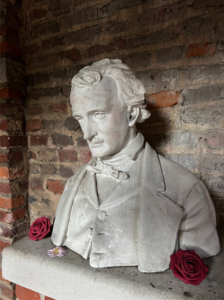Poe-Pourri
Dear Readers,
My research for Book 5, Jacaranda Street: Gravestone Image, continues as I seek “the real” Edgar Allan Poe (1809-1849).
I plan to spin a mystery around some aspect of Poe’s life, but the story will be set in present day California.
What I have discovered to date is that Poe used his writing to experiment on the borderline of conscious and unconscious; fearing death, he sought death within life to escape his social and economic problems, hence, the Gothic poetry and short stories.
Following are three more of the thirteen unusual facts about Poe’s life.* (See my blog, “Know Poe?” dated April 21, 2022, for facts #1-3):
4. Poe was likely named after a Shakespearean Character– Poe’s parents were both actors, who were performing in Shakespeare’s King Lear in 1809, the year Poe was born in Boston. This led to speculation that Poe was named for the play’s Earl of Gloucester’s son, Edgar.
5. Poetry and the Pen Ran in the Poe Family– Poe was the middle child of three. His brother, William Henry Poe, was also a poet; his sister Rosalie Poe was a teacher of penmanship.
6. He Was an Orphan– By the time Poe was three years old, both his parents had died. He was taken in by a wealthy merchant named John Allan and his wife, Frances, who lived in Richmond, Virginia. They christened the boy Edgar Allan Poe.
*According to Melissa Breyer


 So, get a clue, Readers. I will continue to share other interesting facts about Poe in upcoming Thursday blogs as we anticipate Book 5. I hope you’ll be inspired to read or reread some of the works of this very mysterious and, in the opinion of others and myself, misunderstood genius. Poe isn’t just for Halloween!
So, get a clue, Readers. I will continue to share other interesting facts about Poe in upcoming Thursday blogs as we anticipate Book 5. I hope you’ll be inspired to read or reread some of the works of this very mysterious and, in the opinion of others and myself, misunderstood genius. Poe isn’t just for Halloween!

 In the card, Lorie said, “These hearts are your reminder of all the love you received from Jimmy.”
In the card, Lorie said, “These hearts are your reminder of all the love you received from Jimmy.”

 The exact day of his birth is not known, but his baptism was recorded in the Parish Register of Holy Trinity Church in Stratford on Wednesday, April 26, 1564. Baptisms routinely took place then within three days of birth and always before the first Sunday after birth. As a result, many people around the world have come to celebrate Shakespeare’s birthday on April 23.
The exact day of his birth is not known, but his baptism was recorded in the Parish Register of Holy Trinity Church in Stratford on Wednesday, April 26, 1564. Baptisms routinely took place then within three days of birth and always before the first Sunday after birth. As a result, many people around the world have come to celebrate Shakespeare’s birthday on April 23. What is known is that Shakespeare made a will in January of 1616, then revised it one month before his death. Did that mean he knew he was dying? Not necessarily. It was customary in England among people of means to prepare a will so as to get their worldly affairs in order.
What is known is that Shakespeare made a will in January of 1616, then revised it one month before his death. Did that mean he knew he was dying? Not necessarily. It was customary in England among people of means to prepare a will so as to get their worldly affairs in order.


